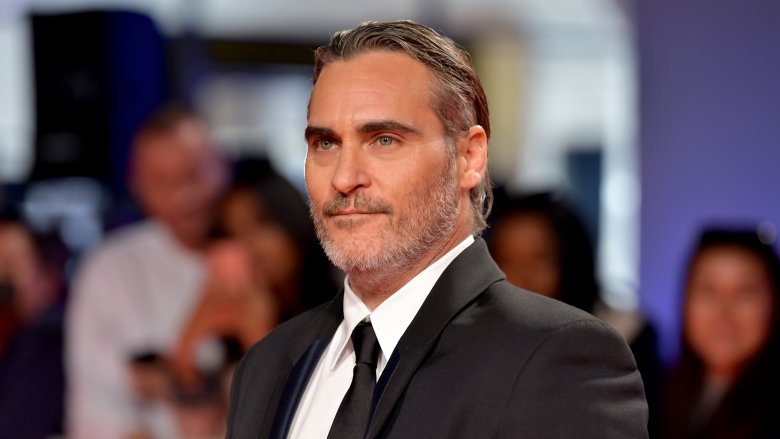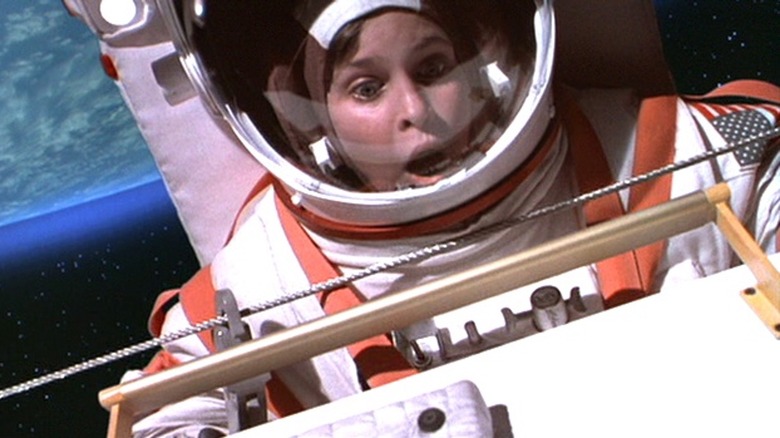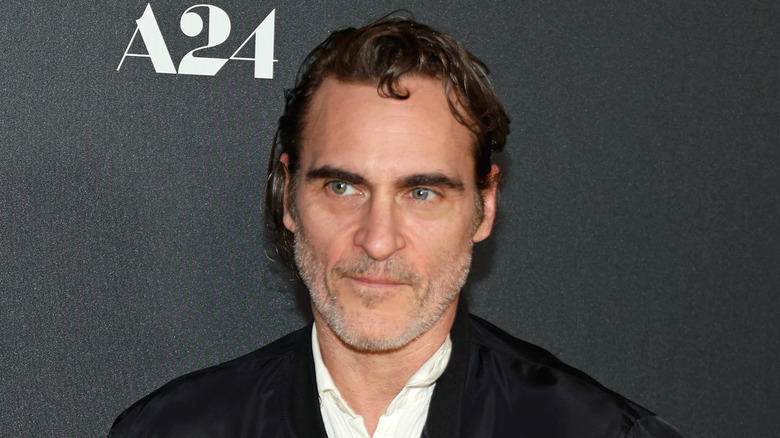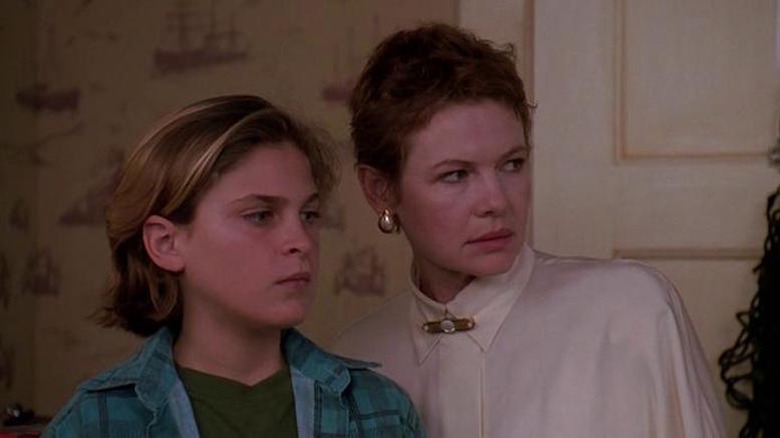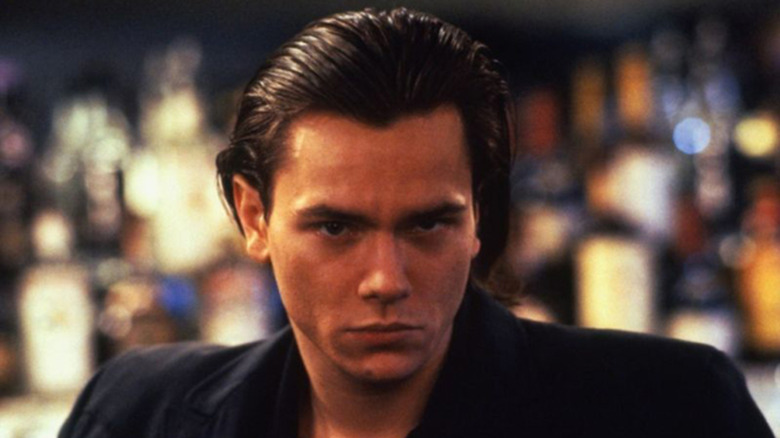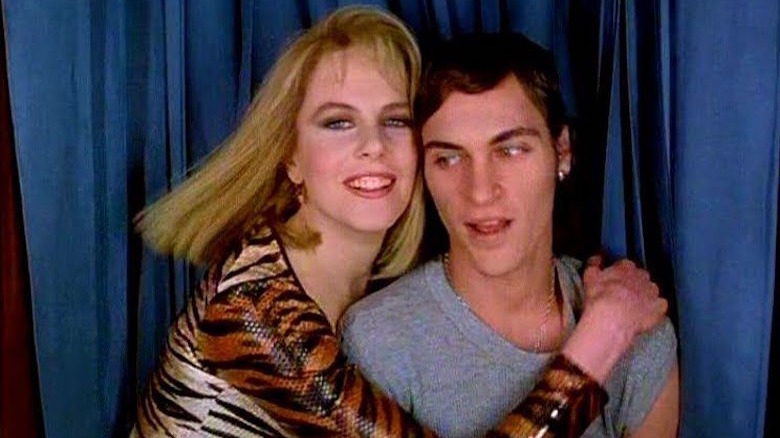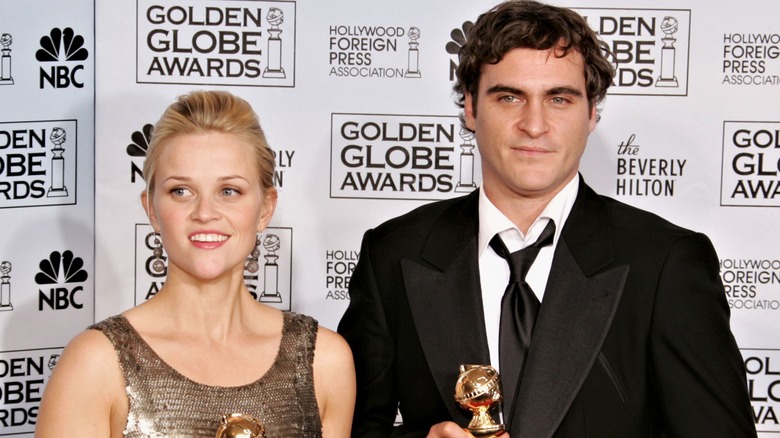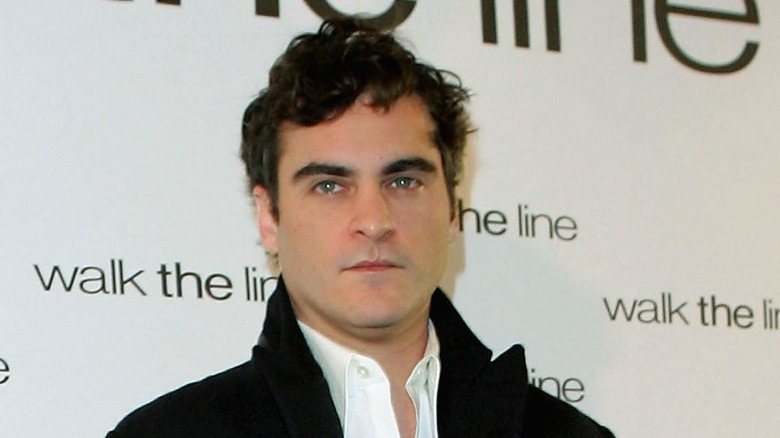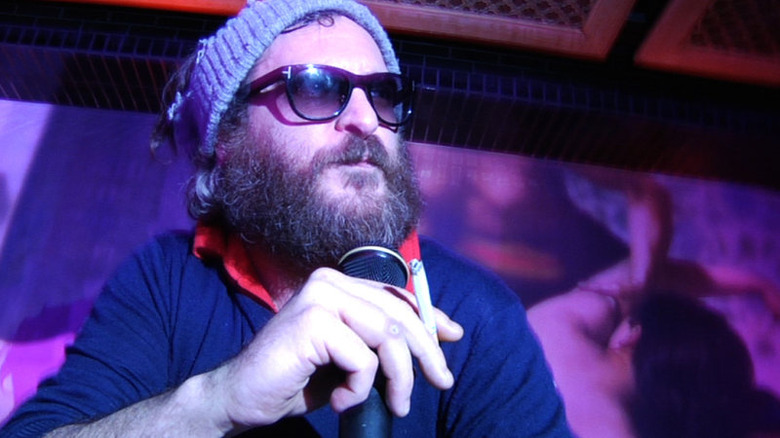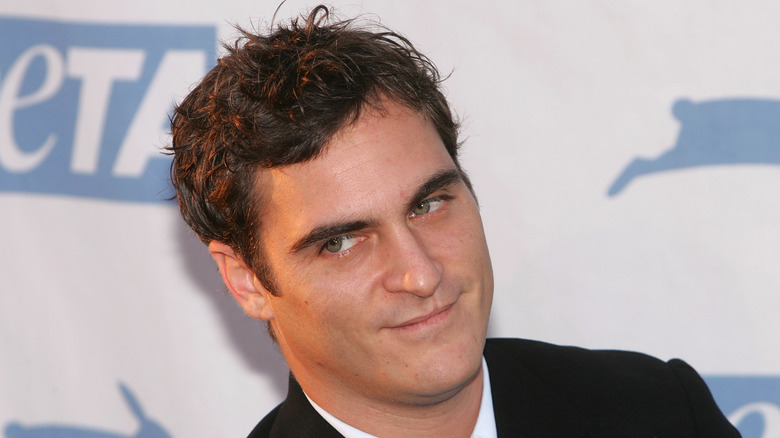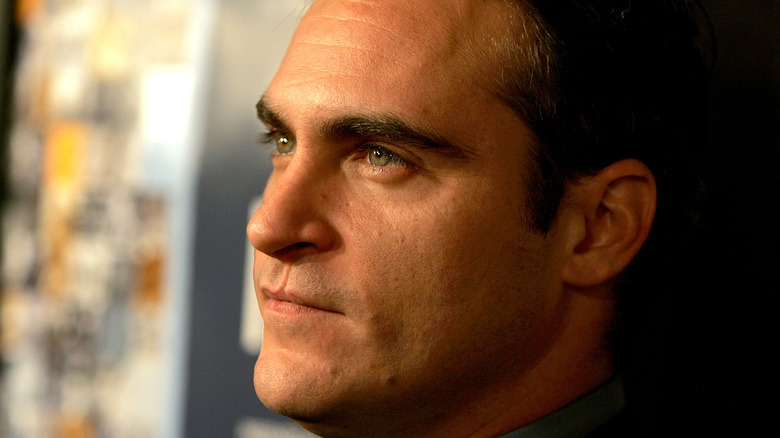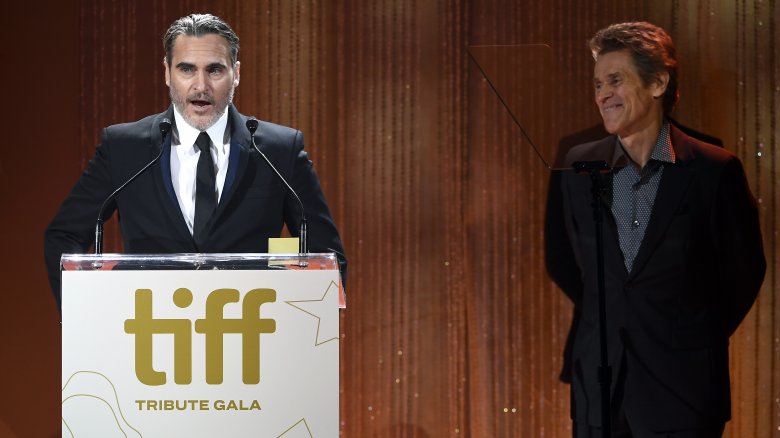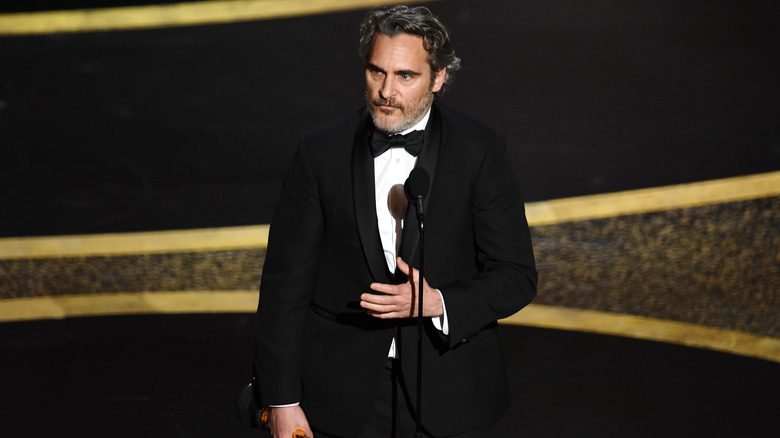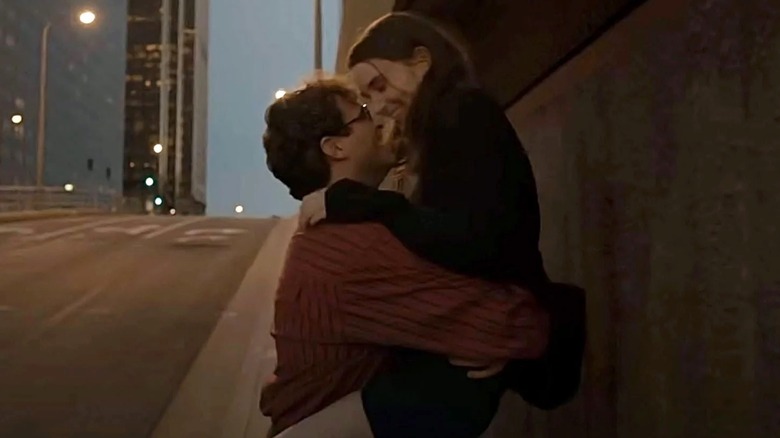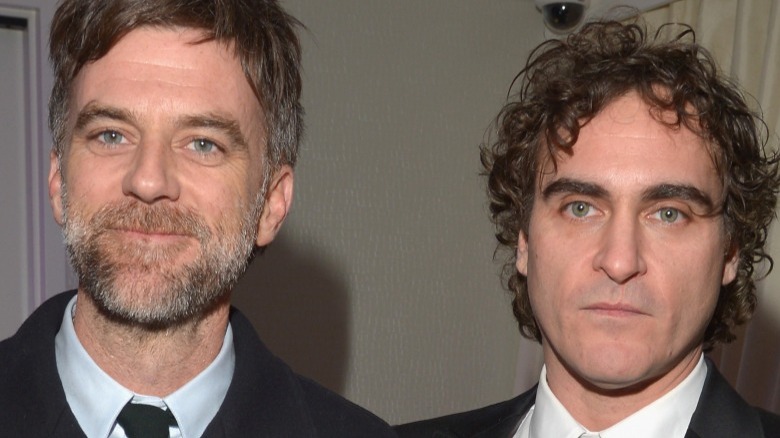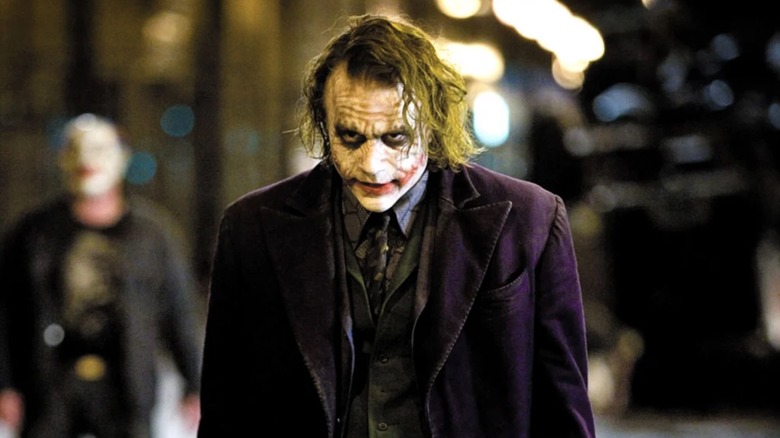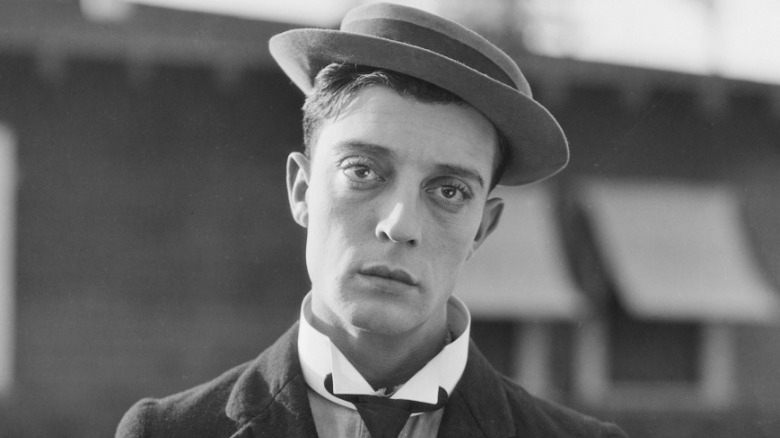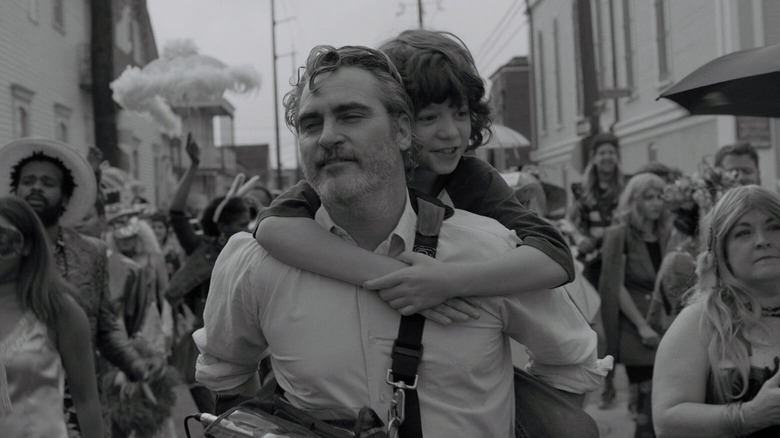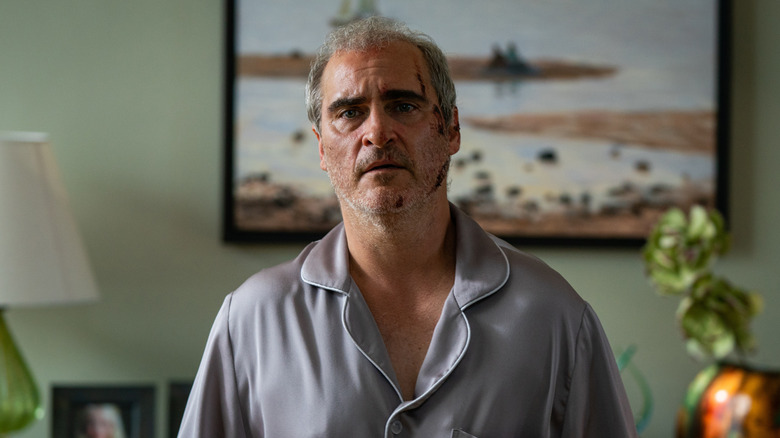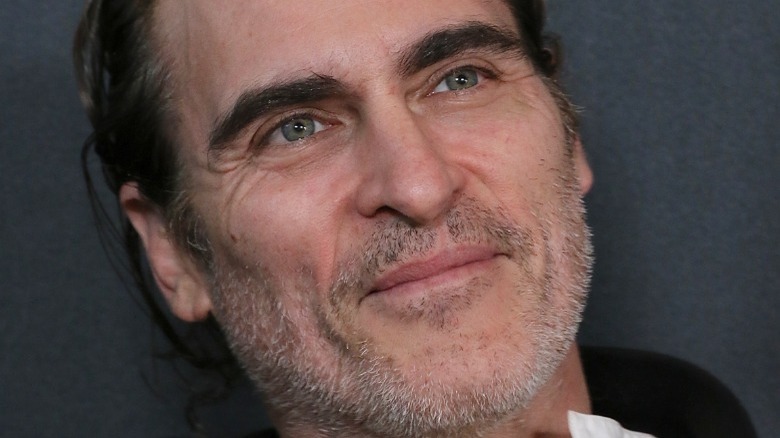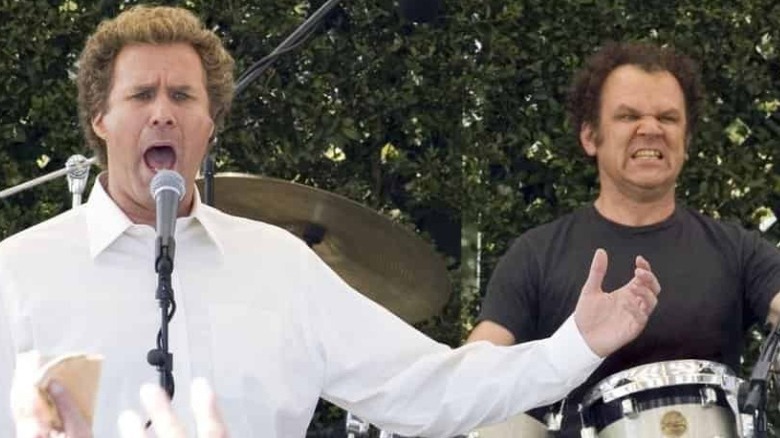The Untold Truth Of Joaquin Phoenix
Joaquin Phoenix is one of the most versatile actors working in Hollywood, taking on romantic roles with as much style and panache as action or thrillers, crafting three-dimensional characters so seamlessly viewers often forget about the man behind them. From embodying country music icon Johnny Cash in "Walk the Line," down to his distinctive singing voice, to the vicious sadism of Emperor Commodus in "Gladiator," to his Oscar-winning turn as the Clown Prince of Crime in "Joker," Phoenix has proven again and again that his range is virtually unmatched by his peers.
But unlike many other movie stars who fell into the industry through various privileges, Phoenix's rise to critical acclaim and financial success was neither assured or straightforward. A challenging early childhood as well as the traumatic loss of his older brother River when he was still a teenager were huge obstacles for Phoenix to overcome to get where he is today. With his future as an American cinematic legend fully secure, let's explore Joaquin Phoenix's fascinating past.
Joaquin Phoenix's tumultuous early childhood
Born Joaquin Rafael Bottom on October 28, 1974 in Puerto Rico, Phoenix had nomadic early years as his parents Arlyn (who goes by Heart) and John were members of the Children of God Christian missionary group, now classified as a cult. Because of their involvement in that organization, the Bottoms traveled all over South and Central America, spending the most time in Venezuela where the cult's increasingly sinister practices began to disenchant Joaquin's parents. Children of God reportedly encouraged sexual activity in children as young as three years old. While Joaquin has never spoken about being abused himself, his older brother River openly discussed having his first sexual contact at the age of four.
After escaping Children of God, Heart and John returned to the U.S. with their five kids in tow to live with Heart's family in Florida before eventually moving to Los Angeles. They changed their last name from Bottom to Phoenix, honoring the symbol of a mythical creature rising from the ashes that would eventually define the family when they became famous. Joaquin also decided to go by the first name Leaf, to match better with his brother River and their sisters Summer, Rain, and Liberty. The Phoenix kids played music on the streets for rent money until their mom got a job as secretary to an NBC casting agent. Through Heart's networking, well-known casting agent Iris Burton was won over by their talent and shepherded them into the bright lights of Hollywood.
If you or anyone you know has been a victim of sexual assault, help is available. Visit the Rape, Abuse & Incest National Network website or contact RAINN's National Helpline at 1-800-656-HOPE (4673).
Phoenix was born with his lip scar
Joaquin Phoenix often transforms his distinctive appearance and immerses himself in his characters: From the burly and bearded Joe in "You Were Never Really Here" to the slight and skittish Arthur Kent in "Joker," the actor's Method acting in each film pays huge dividends. However, regardless of his transformations, the actor's small upper lip scar remains readily apparent when he is clean-shaven. Phoenix was born with his lip scar as the result of a microform cleft. A microform cleft is the most mild form of a cleft palate, appears at birth, and in most patients (including Phoenix) does not require surgery.
In 2020, after talk show host Wendy Williams tastelessly pointed out the actor's lip scar in an on-air segment, she angered many of the actor's fans. According to Entertainment Weekly, on an episode of "The Wendy Williams Show," Williams said, "When [Phoenix] shaves off his mustache he's got a hairline fracture. He's got one of those — what do you call it — cleft lip, cleft palate." She then proceeded to mimic a cleft lip. Phoenix did not respond to the TV host's comments, but the moment led Cher to take to Twitter and call for the host's firing. Ultimately, Williams issued an apology and made donations to the charities Operation Smile and the American Cleft Palate-Craniofacial Association.
Phoenix's introduction to acting
Joaquin Phoenix went by his chosen name Leaf for the first few years of his acting career, but it was actually his brother who snagged the first screen role in the television show "Seven Brides for Seven Brothers." River quickly brought his family along; Joaquin had his first TV role on that show too, quickly followed with the "ABC Afterschool Special Backwards: The Riddle of Dyslexia" and "Murder, She Wrote," as well as the crime procedurals "The Fall Guy" and "Hill Street Blues" between 1982 and 1984. As River's star began to rise in movies, with his breakout in "Stand By Me," Joaquin also landed juicy lead roles in "SpaceCamp" in 1986 and "Russkies" in 1987.
Joaquin's first truly big break wouldn't come until 1989 with the Steve Martin family dramedy "Parenthood," as troubled youngster Garry, a boy struggling with his father's abandonment of his family. The film was a hit, and Phoenix was nominated for a Young Artist Award for Best Leading Young Actor for this nuanced and heartbreaking performance. But just as Joaquin was set to follow in his brother's successful footsteps, another tragedy hit his family that prevented him from acting for almost two years.
Losing his beloved older brother River
On Halloween night in 1993, Joaquin Phoenix was at Hollywood nightclub the Viper Room when his brother River overdosed on a cocktail of drugs. Joaquin was the one who made a hysterical call to 911 while their sister Rain tried to resuscitate River using CPR. River died later at the hospital, a trauma that impacted Joaquin and the Phoenix family immeasurably. Joaquin was only 19; his brother had recently turned 23.
Joaquin Phoenix was so devastated by his brother's sudden death that he didn't act for almost two years. It certainly didn't help that the recording of his 911 call in such an intimate moment of tragedy was publicized, along with leaked photographs of River's open casket, which quickly hit tabloid shelves. By this time, Joaquin's parents had split up and his father John had moved back to South America. While Joaquin's mom and sisters retreated to their family property in Florida and the safety of their connection in privacy to mourn and heal, Joaquin went to live and travel with his father instead.
The first Joaquin-naissance
Joaquin Phoenix was hit extremely hard by the loss of his brother River, but when he came back to acting, he did so with a vengeance. He decided to return to his given name Joaquin instead of Leaf, seen for the first time in the credits of Gus Van Sant's critically acclaimed film "To Die For" — which kickstarted a fierce new chapter of Phoenix's career in 1995. Based on a true story, "To Die For" saw Phoenix as Jimmy, a young man whose married girlfriend (played by Nicole Kidman) convinces him to kill her husband.
After the success of "To Die For," Phoenix went on to work with Oliver Stone on "U-Turn," then appeared in the romantic drama "Inventing the Abbotts" and the thrillers "Clay Pigeons" and "8MM." But it wasn't until Ridley Scott's "Gladiator" that Phoenix's talents brought him his first Oscar nomination for his layered performance as Emperor Commodus. By the time he worked with M. Night Shyamalan on "Signs" and "The Village," Phoenix had established his career in his own right.
Method acting leads to more nominations and a few wins
While Joaquin Phoenix's earlier roles were each marked with singular iterations of Phoenix's profound emotional depth, he took things to a new level with his style of Method acting in "Walk the Line" in 2005, embodying legendary country singer Johnny Cash right down to his singing voice — and earning a Grammy as well as a Golden Globe for his tremendous work.
Phoenix then stunned audiences and critics with his role as Freddie Quell in Paul Thomas Anderson's "The Master," which earned him his third Oscar nomination. He also starred in Spike Jonze's strangely poignant science fiction dramedy "Her," as a lonely man who falls in love with his computer operating system. In the hands of a less talented actor "Her" might have turned into an absurdist comedy, but true to form, Phoenix brought his trademark empathy and humanity to the role.
Phoenix spent time in rehab after Walk the Line
Diving deep emotionally and physically to embody Johnny Cash and the addictions that shaped his life and career came with a dark side for Joaquin Phoenix: After filming for "Walk the Line" wrapped, he checked himself into rehab for a brief stint. Phoenix had never been more than a social drinker before "Walk the Line," and had increased his alcohol consumption significantly to better understand Cash. As he told London magazine (via the Irish Examiner), "I was really leaning on alcohol to feel okay. That's really what it was."
"To play Cash, I had learned a whole new way of functioning in the world, and suddenly, I couldn't rely on that anymore," he told the New York Times. "You go into a space of not having a routine to your day, of not knowing what you're going to say, and it's like, who are you? What are you? It's so easy to have a drink to just feel okay about being nothing." Phoenix joined Alcoholics Anonymous, telling the Times it was "the best thing" he ever did for himself. Opening up about his problems with alcohol also led Phoenix to admit to other mental health issues, like severe anxiety about performing.
During this difficult time, Phoenix also had a terrifying brush with death when his brakes failed and his car crashed. Amazingly, he was rescued by documentary filmmaker Werner Herzog, and nobody was badly injured.
Phoenix retires from acting to become a rap star
From 2009 to 2010 the public at large was worried about Joaquin Phoenix, wondering if he was on drugs — or worse — when he announced his retirement from acting to become a rapper. This period was marked with Phoenix behaving erratically in interviews and talk shows like his now-infamous David Letterman appearance — all of which would turn out to be an elaborate piece of performance art directed by Phoenix's then-brother-in-law Casey Affleck that was eventually turned into the mockumentary "I'm Still Here."
While the film didn't get the kind of critical reception the creators hoped, it managed to help rehabilitate the terrible image Phoenix had cultivated for almost two years. He was quickly forgiven by Hollywood, clearly — since "I'm Still Here," Phoenix landed several other roles of a lifetime, including "The Master," "Her," "Inherent Vice," and Todd Phillips' "Joker."
He's been a lifelong vegan and animal rights activist
In an interview with Collider, Joaquin Phoenix discussed the moment in his childhood that made him, and soon his whole family, lifelong vegans. "They were catching fish, and I guess to stun them they were throwing them against the side of the boat," he recalled. "I just had a profound strong reaction. It felt like a real injustice ... I think it made me distrustful, and angry, and frightened of humans, humanity. I just thought it was such a gross abuse of power in a way. I think that during that moment we knew that we were not going to eat meat anymore." He was four years old at the time and hasn't eaten meat since.
Phoenix has also used his celebrity platform to further various causes for animal rights. He is a PETA spokesperson, as well as a spokesperson for Defense of Animals. He narrated the documentary "Earthlings," which focused on how capitalism fuels animal abuse. He starred in a 2013 PETA short film, and was also executive producer on the Netflix documentary "What The Health" in 2017, which argues that a vegan lifestyle can prevent cancer.
Phoenix has also been involved in a great deal of charity work, including working with Amnesty International, the Red Cross, the American Foundation for AIDS Research, and many more. He has also been on the board of directors for the Lunchbox Fund, an organization that provides meals for underprivileged South African children in Soweto.
Phoenix has directed a number of music videos
In many ways Joaquin Phoenix's life has been shaped by music as much as by acting. It was singing and dancing on street corners that helped him and his siblings develop their considerable talents, and it was his phenomenal performance as Johnny Cash in "Walk the Line" that earned Phoenix a Grammy and Golden Globe. His experiment with musical performance art for "I'm Still Here" also complemented his Method acting skills. It's no surprise, then, that Phoenix would try his hand at directing, beginning with music videos.
From 2005 to 2006, Phoenix directed four music videos. The first was for Ringside's "Tired of Being Sorry" starring Balthazar Getty, and it has a distinct James Bond meets "Raging Bull" flair with a twist. His next was She Wants Revenge's "Tear You Apart," which reads like a surreal homage to foreign films and horror movies. He developed his neo-noir aesthetic further in the video for "Little Lover's So Polite" by the Silversun Pickups, while Phoenix's video for People in Planes' "If You Talk Too Much My Head Will Explode" uses long takes and emotional close-ups. It's an impressive body of work, but Phoenix told Collider that directing "wasn't for me" and he had no plans to dabble in it again.
Joaquin Phoenix opens up about his brother
Riding a wave of critical acclaim for his performance in the comics-inspired 2019 drama "Joker," Joaquin Phoenix received the Toronto International Film Festival Tribute Actor Award alongside Meryl Streep. The award recognizes decades of cinematic excellence, and during his acceptance speech Joaquin made rare and emotional comments about his late brother River. "When I was 15 or 16, my brother River came home from work and he had a VHS copy of a movie called 'Raging Bull,' and he sat me down and made me watch it," he recalled. "And the next day he woke me up, and he made me watch it again. And he said, 'You're going to start acting again, this is what you're going to do ... He didn't ask me, he told me. And I am indebted to him for that because acting has given me such an incredible life."
During a speech that started out with self-deprecating humor, that raw and vulnerable turn only made this honoring of his career even more poignant. Joaquin Phoenix also credited his father John Lee for gifting him with an exceptional work ethic that helped him get to this point, but also quipped that it might not have fully been on display on the "Joker" set.
His awards and nominations haven't inflated his ego
Over the course of his lengthy acting career, Joaquin Phoenix has earned a staggering 190 award nominations and 71 wins. This impressive list includes three Academy Award nominations — best supporting actor for "Gladiator" and best actor for "Walk the Line" and "The Master" — and one best actor win for "Joker." For many actors, awards reaffirm the quality of their work, and are worn as a badge of honor. However, Phoenix eschews basking in the awards he's received. If anything, he seems disturbed by the honors bestowed upon him.
In his 2012 discussion with Interview magazine, the actor discussed awards season and his discomfort with the whole process. "I don't want to be a part of it. I don't believe in it," he said. "Pitting people against each other ... It's the stupidest thing in the whole world."
Although his casting in "Walk the Line" received approval from Johnny Cash, Phoenix went on to explain how ceremonial praise for that film was a hard experience for him, and that he never wanted to relive it. After Phoenix won his first Academy Award for "Joker," he told The Sunday Times that he still had trepidation about awards, stating, "I was not excited about the opportunity. It's just not who I am. I was full of fear."
Phoenix met Rooney Mara on the set of Her
Joaquin Phoenix shared a three-year romance with actress Liv Tyler in the '90s and was romantically linked previously to actresses Jessica Joffe and Amelia Warner, among others, but the private actor was mostly tight-lipped about his romances. Nevertheless, Phoenix and Rooney Mara, who began as friends, have been in a committed relationship for many years. The couple first met in 2012 as costars of the Spike Jonze-helmed sci-fi romance, "Her." It wasn't love at first sight; as he told Vanity Fair, Phoenix was initially convinced Mara didn't like him. However, the actor was intrigued and the two costars became quick friends. "She was the only girl I ever looked up on the internet. We were just friends, email friends," he said.
The friendship continued to blossom, and in 2017, Phoenix told the New York Times that it was Mara who prompted him to play Jesus opposite her Mary Magdalene in the biblical film, "Mary Magdalene." The friendship turned to romance soon after filming wrapped. By the 2017 awards season, the couple had appeared together in public, and in 2020, Phoenix and Mara welcomed a son, River (named for the actor's late brother). The pair got engaged in 2019, and although a public wedding announcement has yet to come, Hello! magazine shared that in 2022, Phoenix began to refer to Mara as his wife.
Paul Thomas Anderson referred to Phoenix as his monkey
Award-winning director Paul Thomas Anderson is known for the unique and intense dramatic vision displayed through many of his films. After his breakthrough second feature, "Boogie Nights," Anderson continued to wow critics and audiences with films like "Magnolia," "There Will Be Blood" and "Licorice Pizza." It makes sense that Anderson and Joaquin Phoenix would eventually team up: The actor's impressive body of work, including "Clay Pigeons" and "Two Lovers," often parallels the director's in terms of psychological intensity sprinkled with comedic moments.
The duo's first collaboration,"The Master," gained Phoenix a best actor Oscar nomination as Freddie Quell, a haunted war veteran looking for post-war meaning before joining a cult led by Lancaster Dodd (Philip Seymour Hoffman). Phoenix told Time magazine that Anderson called him "Bubbles" on the set. "Bubbles was Michael Jackson's pet monkey, and I was Paul's pet monkey," he explained. "The key to Freddie is an animal, just pure id." However, Phoenix didn't take offense at his director's term of endearment, and next collaborated with him on the 2014 film "Inherent Vice." In 2018, Phoenix told Collider, "I feel strongly about Paul. I have so much love and respect for him as a man and as a creative person."
Heath Ledger was his favorite actor
The acting styles of Joaquin Phoenix and Heath Ledger both adhere to intense Method techniques, and the career paths of the two actors were on a similar trajectory. Both were nominated for multiple awards, and both largely shunned mainstream A-list roles for meatier character work. Ledger devoted himself to authentic portrayals and transformed his physicality when called for — much like Phoenix. Until Ledger's tragic death in 2008, his performances in films like the gay cowboy romance, "Brokeback Mountain" (which earned him his first Academy Award nomination) and the gritty drama "Monster's Ball" showed his huge potential.
Before Joaquin Phoenix won his first Oscar for "Joker," Heath Ledger posthumously won his only Oscar for playing the Joker in "The Dark Knight." Although Phoenix plays the psychotic criminal in the time leading up to his transformation, and Ledger's Joker has already begun his rivalry with Batman, both actors give riveting portrayals of a deeply troubled man. It turns out that the two actors were friends in real life, and Phoenix thought highly of his fellow Method actor. When Phoenix accepted a Screen Actors Guild Award for his "Joker" role, he gave Ledger a heartfelt shout-out, and video footage (via Deadline) shows that he ended his acceptance speech by stating, "Really, I am standing here on the shoulders of my favorite actor, Heath Ledger."
Buster Keaton influenced his role in Joker
Part of what makes the performance of Joaquin Phoenix in "Joker" so impressive is how the actor was able to take a role played by other legendary actors like Heath Ledger and Jack Nicholson and truly make it unique.Yet Phoenix proved his unique take and nuanced performance worthy of adding another memorable Joker to the mix. While dark, disturbing characters like Arthur Fleck in "Joker" don't normally conjure up images of the legendary, silent-film era comic actor Buster Keaton, Phoenix drew heavily on Keaton's comedy to inspire his character's development. Even in silent films, Keaton never overacted, and often took subtle, deadpan beats in between very physical reactions.
At the 2019 Venice Film Festival, Phoenix shared with reporters how he took a fresh approach to playing the Joker. "The attraction to make this film and this character was that we were going to approach it in our own way," he said. "So, for me, I didn't refer to any past iterations of the character." Part of the actor's approach included studying Buster Keaton films. Phoenix shared with Vanity Fair that to play Fleck, he drew from the outlandish physicality of Keaton along with the musical acting style of 1930s performer Ray Bolger, who played the Scarecrow in "The Wizard of Oz." Keaton's influence inspired Fleck's haunting movements and the weird dances the character performs as he descends into madness.
Phoenix initially turned down his role in C'mon C'mon
In the black and white drama "C'mon C'mon," Joaquin Phoenix delivers a strong performance as Johnny, a radio personality who travels the country to interview children about their inner thoughts on the future, showcasing the fears and hopes of kids everywhere. After a stop in Detroit, Johnny's sister Viv (Gaby Hoffman) asks her brother to help care for her nine-year-old son, Jesse (Woody Norman), while his dad, Paul (Scoot McNairy), deals with mental illness. Thrust into surrogate parenthood, Johnny learns much about himself and grows to love his nephew.
"C'mon C'mon" received great reviews from critics and audiences alike, and Phoenix exudes extraordinary chemistry with his excellent young costar. Yet Phoenix almost turned down the role. In an interview with The Playlist, director Mike Mills revealed that he'd always wanted Phoenix for the part. However, when Mills first met with Phoenix about the film, Phoenix said that Johnny wasn't right for him. After an intense discussion about the script. he changed his mind. "All the conversations we were having about the script, even his hesitations, or parts that felt blank for him, it was all fascinating. I just knew regardless, it was making it all better," Mills said.
If you or someone you know is struggling with mental health, please contact the Crisis Text Line by texting HOME to 741741, call the National Alliance on Mental Illness helpline at 1-800-950-NAMI (6264), or visit the National Institute of Mental Health website.
Beau is Afraid made him squirm
In the mind-bending horror-comedy "Beau is Afraid," Joaquin Phoenix plays Beau Wasserman, a middle-aged nebbish man plagued with anxiety, who must travel home after the tragic death of his wealthy, overbearing mother, Mona (Patti LuPone). Beau's trip back home is, well, trippy: The film evokes Kafkaesque, Lynchian dangers, obstacles, and fears that Beau must overcome in order to reach his destination. Absurdist horror and humor abound throughout, and with a three-hour running time, the film may feel overwhelming to audiences.
"Beau is Afraid" offers a wild ride through Beau's perspective, and the movie opened to mixed reviews. In an interview with Fandango, Phoenix recalled watching the film as an audience member. "I was definitely squirming in my seat," he said, adding, "It is 100% a movie that you feel. There's so many rich, complex themes in this film, but it's such a visceral experience to watch it." The movie is the third offering from horror film director Ari Aster ("Midsommar," "Hereditary"), and although its terrifying moments are broken up by moments of levity, "Beau is Afraid" shares intense shock-value moments with Aster's earlier features. Phoenix also recounted to Fandango a conversation with a friend, who told him that college students were planning on taking psychedelic mushrooms before watching the film; the actor jokingly warned that this was a terrible idea.
Acting gives Phoenix severe anxiety
Joaquin Phoenix may not have much in common with his anxious character, Beau Wasserman, but he does understand the often overwhelming nature of severe anxiety. Although the actor is over three decades into his acting career, new roles can still bring up struggles with the condition. An article in British GQ disclosed that Phoenix used to smoke cigarettes to calm his inner angst, and did so when he received his first Academy Award nomination for "Gladiator." The article also noted that the actor would spend weeks in a state of debilitating anxiety before even beginning to shoot a new movie, to the point of feeling physically ill the day before he's first due on set and perspiring heavily for weeks while shooting.
However, although the actor's anxiety is evident in many of his films, it doesn't lead to bad or weak performances. Phoenix harnesses his anxiety to fuel his roles and embodies powerfully resonant characters. Many of the nuanced characters he's played — from washed-up baseball player Merrill Hess in M. Night Shyamalan's alien invasion drama "Signs" to Johnny Cash in "Walk the Line" — have a nervous quality that makes them ooze authentic, flawed humanity.
He loves the Will Ferrell comedy Step Brothers
Joaquin Phoenix's serious nature as a performer doesn't encompass his entire personal life. Although the actor may be familiar with darkness, he enjoys hilarious moments too. Even hardcore Phoenix fans may be surprised to discover that he counts the comedy "Step Brothers" as one of his favorite movies. The film stars Will Ferrell as Brennan Huff, and John C. Reilly as Dale Doback, 40-year-old men with a shared middle school-level maturity who still live in their respective childhood homes with their single parents. When Brennan's mom (Mary Steenburgen) and Reilly's dad (Richard Jenkins) fall in love and get married, the new stepbrothers must learn to get along and forge a path into true adulthood.
Directed by Adam McKay,"Step Brothers" garnered mixed reactions from moviegoers, but has become a timeless cult classic in the years since its release ... and Joaquin Phoenix loves it. The actor told Far Out magazine that the film made him "pee his pants and fall down laughing," and went on to disclose that he's watched the movie multiple times.
